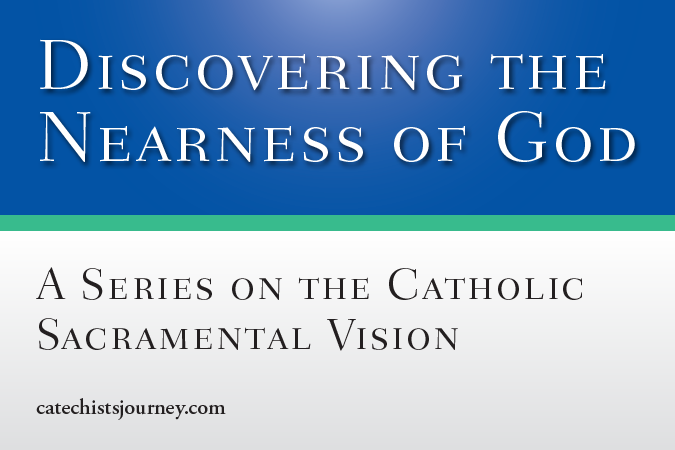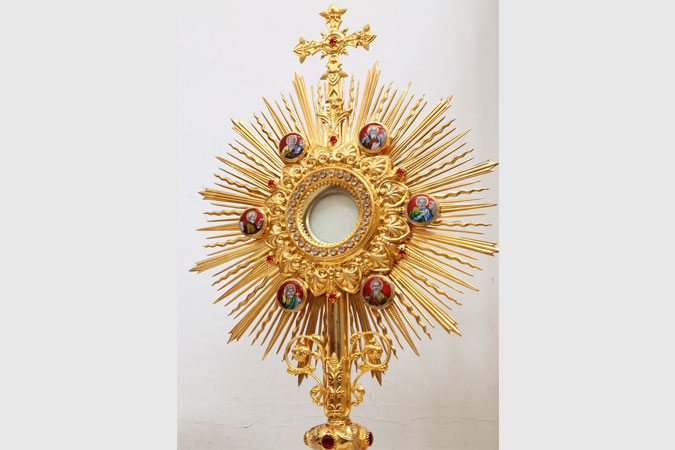
Welcome to the fourth installment of my series “Discovering the Nearness of God: An Eight-Week Series on the Catholic Sacramental Vision.” This week we will explore the Sacrament of the Eucharist, with the theme of “What Do You Crave?”
Researchers tell us that the majority of us experience regular cravings for specific foods. It’s important to remember that hunger and cravings are not synonymous. The former is driven by the body, while the latter is driven by the mind. Hunger seeks to satisfy a physical need. A craving seeks to satisfy an emotional need. That’s why cravings are not limited to food. We can find ourselves craving any and all of the following: a drink, sleep, sex, power, possessions, friendship, novelty, intimacy, contentment, fun, pleasure, adventure, and so on. Ultimately, all of these can be attributed to three basic human cravings:
- We crave something substantial so that it fulfills us. If we crave something sweet, we prefer something substantial like a piece of fudge rather than a cheap candy bar.
- We crave something delightful so that it pleases us. Whether it is food, drink, or a piece of art, we gravitate toward those things that look, smell, taste, and feel pleasing.
- We crave something valuable so that it benefits us. It often seems as though we crave things that are just beyond our usual reach, either physically or financially.
We hope that, by possessing these three things, we will successfully transcend our present narrative of incompleteness to one of fulfillment, even if temporary. This brings us to the Sacrament of the Eucharist, the “food” that promises to satisfy our deepest cravings. St. Ignatius of Loyola taught that, ultimately, all of our desires can be traced to our desire for God. The Catechism of the Catholic Church teaches us that “the desire for God is written in the human heart.” (#27) In other words, our deepest craving is for a fulfillment that only God can provide. God, in turn, continually goes out of his way to provide us with access to the food that is his grace, culminating in the sending of his only Son, Jesus, who was born in Bethlehem—a name that means “house of bread”—and laid in a manger, which is a feeding trough for animals. Jesus referred to himself as the Bread of Life and, in his final act before giving himself up to be sacrificed like a lamb, he gave us the Eucharist: his presence in the form of simple bread and wine.
Through the Eucharist, we cultivate an awareness and integration of our desires and imperfections, not the removal of them. The various negative behaviors that we too often engage in, seeking temporary relief from our cravings, ultimately dull our awareness. A life that is nourished by the Eucharist is a life focused on being awake and mindful, not about being asleep and mindless. It is about paying attention to our cravings.
We are invited to celebrate the Eucharist as an acknowledgment of our insatiable craving and a commitment to seek satisfaction of that craving in Jesus Christ, the Bread of Life—and not in those things that the false narratives of our culture offer as cheap substitutes. Ultimately, we are a people “in recovery” who, as a result of our Baptism, have embraced a new narrative to replace the “stinking thinking” that led to our addiction to sin. In the wisdom of 12-step groups, one of the most critical components of this recovery is attending regular meetings. While a variety of reasons are given for the necessity of attending regular meetings, some of the most compelling are:
- Addiction is a lonely, self-centered disease. It is important to find healing within the context of relationships that the meetings provide.
- It is important to share your recovery with newcomers lest they be left to fend for themselves.
- Regular attendance at meetings keeps one focused on recovery, helps reduce relapse, and keeps one in his or her “right mind.”
- Through regular attendance, one can find inspiration in the recovery of others.
- Meetings provide a safe and healthy environment for working on recovery.
- There is collective strength in people working together toward recovery in a group.
- We need the support of others when cravings arise.
- Regular attendance enables one to take stock of where he or she is in the recovery process.
- Isolation, which is at the heart of addictions, is overcome by regular attendance at meetings.
- Regular attendance enables one to go back to his or her humanity and focus on core values such as acceptance, faith, trust, honesty, courage, willingness, humility, forgiveness, freedom, perseverance, patience, and love.
- Addiction is chronic; one is never “cured.”
I contend that each of the above compelling reasons for regularly attending and participating in 12-step meetings can and should be applied to attending and participating in a weekly celebration of the Eucharist. We go to Mass to be healed, to be saved, to experience “recovery” from our human addiction to sin. In the end, we go to Mass for the same reason an addict goes to meetings: not for entertainment or for a feel-good experience but for recovery.





Thank you Joe. This certainly coordinates with yesterday’s scriptures. Paul asked us to do what we can to put aside the old self and embrace the new self that response to the spirit of Truth. I find that even on days when I feel like not attending Mass I get there. And even though I don’t feel as spontaneous as I often do, I put myself in the hands of God. Eucharist is the sign to me that God is everywhere and his presence can fill us with a fulfilled life of love, praise and gratitude.
Well said, Frank!